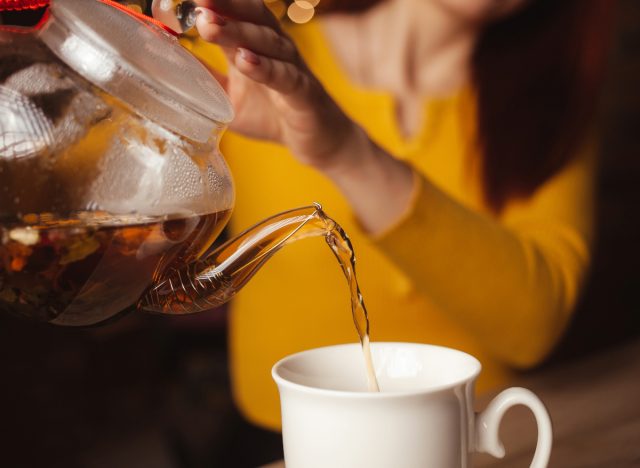Here's How Many Cups of Tea You Should Drink Daily To Slow Aging, Study Reveals

If you're a passionate tea drinker, listen up! (And if you're more of a coffee aficionado, this news may very well convert you.) Did you know that your tea-drinking habit could promote longevity? Brand new research published in The Lancet Regional Health — Western Pacific reveals how many cups of tea you should drink daily to slow aging—your biological age (BA), that is.
Your biological age is essentially the age of your cells. It provides an accurate indication of how healthy you are and how well your body is functioning; it can pinpoint if your body's aging process has sped up or slowed down compared to your chronological age (how long you've lived thus far). In addition, BA can be altered based on certain lifestyle tweaks you make to help you avoid age-related diseases, along with extending your health span. That's where this study comes in. Drinking tea may be the lifestyle intervention you need to live longer. Keep reading to learn more, and pinkies up!
A new study reveals how many cups of tea to drink daily to slow aging.

The study encompassed 7,931 participants between the ages of 30 and 79 from the China Multi-Ethnic Cohort (CMEC) Study, along with 5,998 participants between the ages of 37 and 73 from the UK Biobank (UKB). These individuals completed the baseline and first follow-up surveys. From the get-go, they were asked tea-related questions, such as how often they drink tea and how many cups they drink.
BA acceleration was measured by way of the Klemera Doubal method (KDM), a mathematical algorithm curated to pinpoint BA. It does so by assessing a set of biomarkers in the body that's connected to aging.
According to the research, around three cups of tea (or 6 to 8g of tea leaves) daily could provide the most substantial benefits to slow down biological aging. It's important to note that the researchers defined one cup of tea as 200 ml, which is right below 7 oz, so consuming three of their "cups" equates to roughly 21 fl oz or 2.6 eight-ounce U.S. cups. In addition, this research is based on black and green tea—not herbal teas.
Even though the study didn't delve into why tea contains anti-aging properties, the researchers suggest that various bioactive substances in tea, such as EGCG (a green tea polyphenol), could be the answer. According to additional research, polyphenols like EGCG have been linked to longevity.
The results:

Dedicated tea drinkers and non-drinkers who switched to drinking tea both experienced decreased BA acceleration when compared to non-tea-drinkers. Tea drinkers were also less likely to suffer from anxiety and depressive symptoms, along with insomnia. In addition, drinkers who switched from drinking tea to not drinking it revealed a greater increase in BA acceleration.
If you drink alcohol, you may want to cut back on it to reap the full anti-aging benefits of tea. According to the study, tea's benefits were more apparent in those who didn't drink alcohol compared to those who did. This is especially true for individuals who switched from not drinking tea to drinking it.
- Source: Tea consumption and attenuation of biological aging: a longitudinal analysis from two cohort studies
- Source: A new approach to the concept and computation of biological age
- Source: Tea consumption and attenuation of biological aging: a longitudinal analysis from two cohort studies
- Source: Dietary Anti-Aging Polyphenols and Potential Mechanisms









